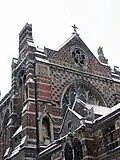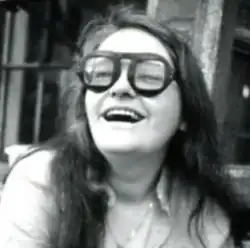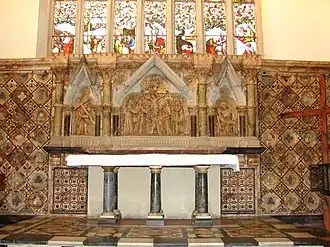Portal:University of Oxford
| Indices | Projects |
The University of Oxford portal
The University of Oxford is a collegiate research university in Oxford, England. There is evidence of teaching as early as 1096, making it the oldest university in the English-speaking world and the world's second-oldest university in continuous operation. It grew rapidly from 1167, when Henry II prohibited English students from attending the University of Paris. When disputes erupted between students and the Oxford townspeople, some Oxford academics fled northeast to Cambridge, where they established the University of Cambridge in 1209. The two English ancient universities share many common features and are jointly referred to as Oxbridge.
The University of Oxford comprises 43 constituent colleges, consisting of 36 semi-autonomous colleges, four permanent private halls and three societies (colleges that are departments of the university, without their own royal charter). and a range of academic departments that are organised into four divisions. Each college is a self-governing institution within the university that controls its own membership and has its own internal structure and activities. All students are members of a college. Oxford does not have a main campus. Its buildings and facilities are scattered throughout the city centre and around the town. Undergraduate teaching at the university consists of lectures, small-group tutorials at the colleges and halls, seminars, laboratory work and tutorials provided by the central university faculties and departments. Postgraduate teaching is provided in a predominantly centralised fashion.
Oxford operates the Ashmolean Museum, the world's oldest university museum; Oxford University Press, the largest university press in the world; and the largest academic library system nationwide. In the fiscal year ending 31 July 2024, the university had a total consolidated income of £3.05 billion, of which £778.9 million was from research grants and contracts. In 2024, Oxford ranked first nationally for undergraduate education.
Oxford has educated a wide range of notable alumni, including 31 prime ministers of the United Kingdom and many heads of state and government around the world. As of October 2022, 73 Nobel Prize laureates, 4 Fields Medalists, and 6 Turing Award winners have matriculated, worked, or held visiting fellowships at the University of Oxford. Its alumni have won 160 Olympic medals. Oxford is home to a number of scholarships, including the Rhodes Scholarship, one of the oldest international graduate scholarship programmes in the world. (Full article...)
Selected article

The Council of Keble College, Oxford ran the college (in conjunction with the Warden) from its foundation in 1868 until 1952. The council – a group of between nine and twelve men – has been described as "an external Council of ecclesiastical worthies", as most of the members came from outside the college, and many were not otherwise linked to the university. Keble was established by public subscription as a memorial to the clergyman John Keble. The first council members were drawn from the committee whose work had raised the money to build the college. By keeping matters relating to religion and the college's internal affairs in the hands of the council, the founders hoped to maintain Keble's religious position as "a bastion of 'orthodox' Anglican teaching" against the opponents of Tractarianism. In total, 54 men served on the Council, 11 of whom were college alumni; in 1903, Arthur Winnington-Ingram (Bishop of London) became the first former Keble student to join the council. It ceased to exist after 9 April 1952, when new statutes of the college placed full management in the hands of the Warden and Fellows. (Full article...)
Selected biography

Kate Millett (born 1934) is an American feminist writer, educator, artist, and activist. She was the first American woman to be awarded a postgraduate degree with first-class honors by St. Hilda's College. She is best known for her 1970 book Sexual Politics, which was her doctoral dissertation at Columbia University. The feminist, human rights, peace, civil rights, and anti-psychiatry movements have been some of Millett's key causes. Her books were motivated by her activism, and several were autobiographical memoirs that explored her sexuality, mental health, and relationships. Besides appearing in documentaries, she produced Three Lives and wrote Not a Love Story: A Film About Pornography. In the 1960s and 1970s, Millett taught at Waseda University, Bryn Mawr College, Barnard College, and University of California, Berkeley. Self-identified as bisexual, Millett was married to sculptor Fumio Yoshimura from 1965 to 1985 and had relationships with women, one of whom was the inspiration for her book Sita. Between 2011 and 2013 she won the Lambda Pioneer Award for Literature, received Yoko Ono's Courage Award for the Arts, and was inducted into the National Women's Hall of Fame. (Full article...)
Selected college or hall

Campion Hall is one of the Permanent Private Halls (PPHs) of the University of Oxford. Unlike the colleges, which are run by their Fellows, PPHs are run by an outside institution – in the case of Campion Hall, the Society of Jesus. One of the smallest constituent institutions of the university, it named after the martyr St. Edmund Campion, who was a Fellow of St John's. Established in 1896 as "Clarke's Hall" as a hall for Jesuit undergraduates, it went through various changes of name as the Master in charge changed, until it achieved permanent status in 1918 and took its current name. Its building on Brewer Street, completed in 1936, was designed by Sir Edwin Lutyens – his only Oxford building. The exterior has been compared to 17th-century Cotswold architecture, and the chapel light fittings have red tassels like those on a cardinal's hat. Jesuit clergy, and priests of other Roman Catholic orders, are admitted to study; laymen are sometimes admitted. Alumni include the poet and writer Peter Levi, the priest and English literature scholar Peter Milward, and the priest and historian Peter L'Estrange (who later became Master of Campion Hall). (Full article...)
Selected image

Did you know
Articles from Wikipedia's "Did You Know" archives about the university and people associated with it:

- ... that the reredos (pictured) installed in 1864 in the chapel of Jesus College, Oxford has been described variously as "handsome", "somewhat tawdry" and looking like "corned beef"?
- ... that the first journal articles written by the entomologist Robert Perkins were published when he was a classics student at Oxford, with no scientific education?
- ... that Vernon Erskine-Crum was appointed General Officer Commanding of the British Army in Northern Ireland in 1971, during the Troubles, but was relieved within a month after suffering a heart attack?
- ... that Kingsley Fairbridge established the first child migration scheme for impoverished British children which over 68 years housed and educated 1,195 boys and girls at his farm school in Pinjarra, Western Australia?
- ... that David Powel compiled and published the first printed history of Wales in 1584, which popularized the legend that Prince Madoc discovered America in about 1170?
Selected quotation
Selected panorama
On this day
Events for 19 August relating to the university, its colleges, academics and alumni. College affiliations are marked in brackets.
Wikimedia
The following Wikimedia Foundation sister projects provide more on this subject:
-
Commons
Free media repository -
Wikibooks
Free textbooks and manuals -
Wikidata
Free knowledge base -
Wikinews
Free-content news -
Wikiquote
Collection of quotations -
Wikisource
Free-content library -
Wikiversity
Free learning tools -
Wikivoyage
Free travel guide -
Wiktionary
Dictionary and thesaurus










